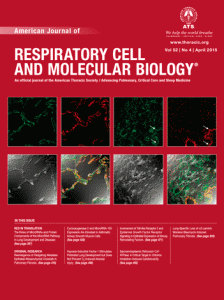 Once again, a team of Duke University scientists has retracted a paper, this time due to “unreliable” figure data.
Once again, a team of Duke University scientists has retracted a paper, this time due to “unreliable” figure data.
With co-authors at the U.S. Environmental Protection Agency, the Duke team has withdrawn a paper from the American Journal of Respiratory Cell and Molecular Biology after concern about data in three figures led them to repeat one of their main experiments. They subsequently found “no evidence” supporting their previous conclusion.
By our count, it is the third retraction from a team that includes William Foster, a pulmonary researcher at the Duke Medical Center. The Duke team retracted a paper in 2013 on a related topic—the effect of early life ozone exposure on airways—from the Journal of Applied Physiology when it was discovered that, familiarly, data in a figure were “unreliable”. Recently, they also retracted a PNAS paper on asthma treatment earlier this month, due to missing primary data and mismatched data from two sources.
The most recently retracted study, “Maternal Diesel Inhalation Increases Airway Hyperreactivity in Ozone-Exposed Offspring,” used pregnant mice to analyze whether exposure to diesel exhaust during pregnancy worsened airway hyperreactivity in the offspring. In the original publication, the team concluded that maternal inhalation of diesel exhaust, combined with pup exposure to ozone gas, resulted in inflamed lungs and airway hyperreactivity.
Based on the notice, however, it appears that finding is no longer supported:
Authors of an article published in 2012 informed the Journal that the data in Figures 3–5 in their paper were found to be unreliable. They therefore repeated one of the main experiments, namely the exposure of newborn mice to postnatal ozone by inhalation, and found no evidence that ozone induces airway hyperreactivity. As this observation is critical to the main findings of the article, the authors have asked the Journal to retract this publication. They regret the inconvenience to the Journal and its readers.
The retracted paper has been cited by 15 other publications, according to Thomson Scientific’s Web of Knowledge.
It is unknown if the data problems in all three papers are connected. In addition to Foster, Erin Potts-Kant is an author on all three papers. Potts-Kant was arrested for embezzling more than $14,000 from the university in 2013 and has since left. A spokesperson for Duke confirmed that the second retraction was related to Potts-Kant’s work at Duke.
In response to our queries, the AJRCMB sent the following clarification about the retraction:
The authors of “Maternal Diesel Inhalation Increases Airway Hyperreactivity in Ozone-Exposed Offspring”, published in the American Journal of Respiratory Cell and Molecular Biology in April 2012, informed the Journal Editor that some of the data presented in the paper were possibly inaccurate. Therefore, they have asked that the article be retracted, and we are honoring that request. This decision has been endorsed by all co-authors except one, who they have been unable to contact.
We have no additional comment on this matter at this time.
We have been unable to locate contact information for Potts-Kant, but we have reached out to corresponding author Richard Auten at Duke for more details. We will post any updates we receive.
Like Retraction Watch? Consider supporting our growth. You can also follow us on Twitter, like us on Facebook, add us to your RSS reader, and sign up on our homepage for an email every time there’s a new post.
I wonder whether the last author of this paper, W Michael Foster, works at Duke anymore? The link to his faculty page you provided with the post about the retraction of the PNAS paper is rather empty: http://pulmonary.medicine.duke.edu/faculty/details/0268710
Foster retired recently. Several of his Duke co-authors have left Duke and set up research labs at other institutions, including the Chief of the Duke Pulmonary Division. One wonders how many NIH grants were awarded based on the ambiguous data and extended. Some of the NIH grants that included Foster as personnel remain active.